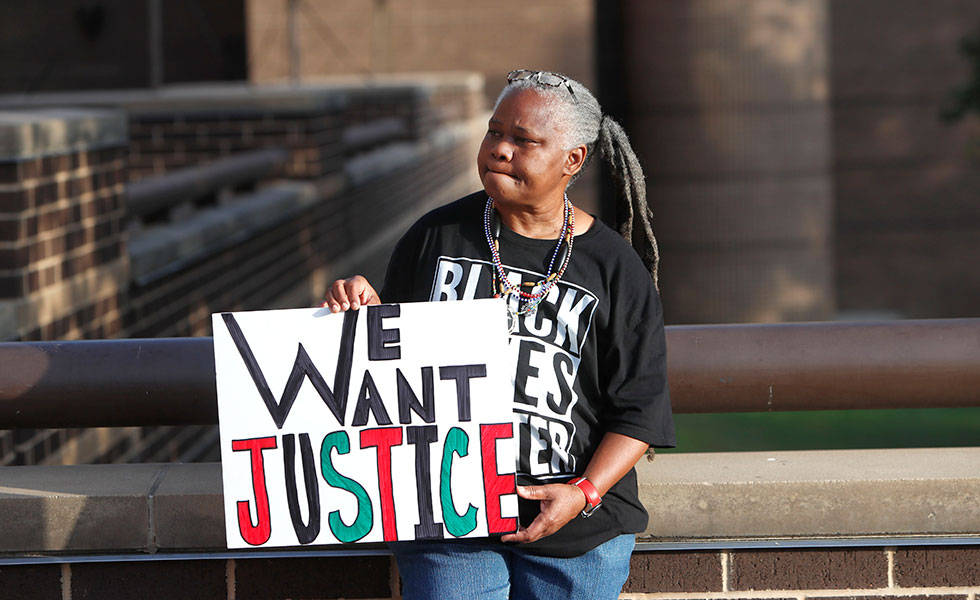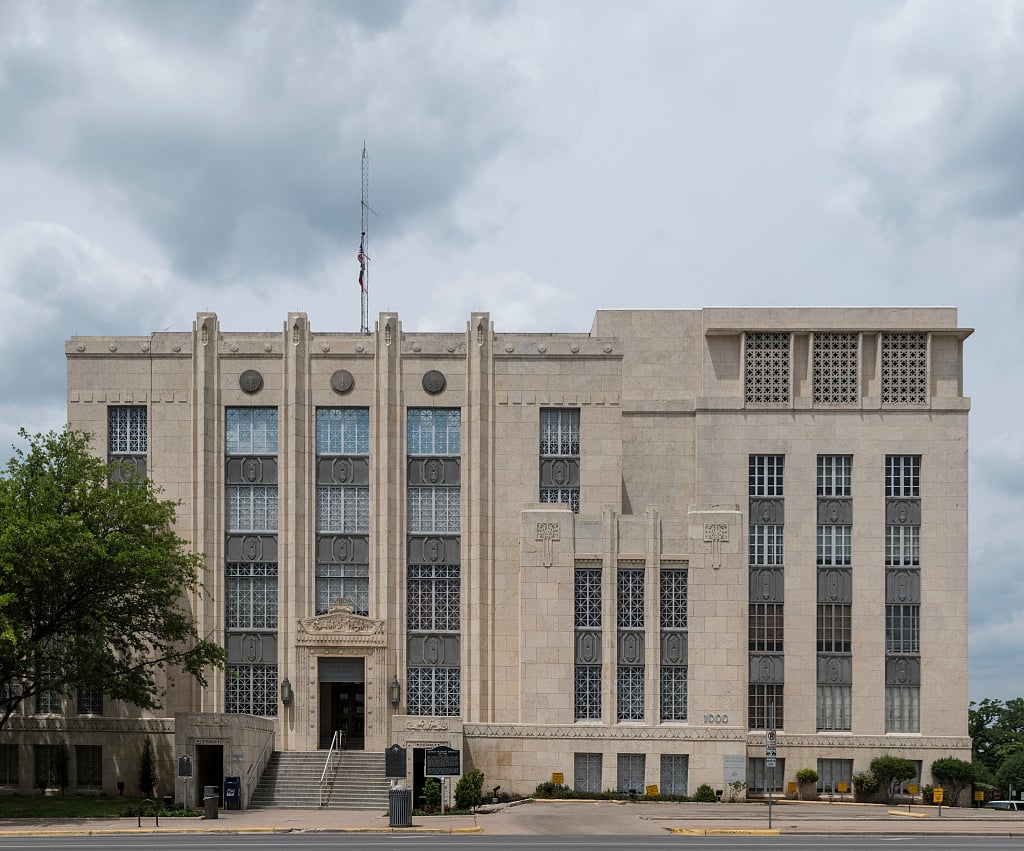
Potter County Criminal Defense System is Lambasted in a New Report
A 200-page report produced by the Sixth Amendment Center exhaustively shows how the long arm of the law gives poor people in Amarillo the short end of the stick.

A version of this story ran in the November / December 2019 issue.
An incendiary new report on the constitutional right to counsel, produced by a nonpartisan watchdog group and obtained by the Observer, uncovers a deeply troubling criminal justice system in Potter County, where Amarillo is located.
The report found that jailers give legal advice to defendants; that court-appointed attorneys rarely meet with their clients; and indigent defendants are left with the bill for legal costs. Even prosecutors find the system icky—one told the report’s authors that it’s “fraught with perils” for defendants.
“It’s a worst-of-the-worst system,” said Jeff Blackburn, an Amarillo defense attorney who founded the Texas Innocence Project in 2006. “It’s a deliberate and systematic violation; they’ve created a system they know is illegal.”
The Sixth Amendment to the U.S. Constitution guarantees that anyone charged with a crime gets access to an attorney, whether they can afford one or not. For poor defendants in all but the most populous Texas counties, this means being randomly paired with government-approved defense lawyers. The attorney then meets with their client, builds a case for their defense, and advocates for the best outcome.
At least that’s what’s supposed to happen. In Potter County, the system gets a little twisted.
Last year, the U.S. Department of Justice approved a grant application for Potter County to study its indigent defense system. Representatives of the Sixth Amendment Center, a criminal justice advocacy group, watched as defendants wound through the process. They also gathered data and interviewed defendants, lawyers, judges, and others.
“It’s a deliberate and systematic violation; they’ve created a system they know is illegal.”
The report describes “a chain of events that impedes the right to counsel,” starting just before a jailed defendant undergoes magistration—or is told what crime he or she is charged with. It’s at this point, the report alleges, that some jailers ask defendants whether they intend to hire counsel, request court appointed counsel, or represent themselves. The jailers dispense advice on how defendants ought to handle their cases, sometimes encouraging defendants facing misdemeanor charges to represent themselves, despite the fact that many of them would qualify for free counsel.
In one interaction, a jailer asked, “Do you want to apply for a court appointed attorney, hire one, or go ahead and represent yourself?” The jailer continued: “You do not have to have an attorney for a Class B misdemeanor. You can get yourself into plea court, hear what the prosecutor has to offer, and then get a lawyer later if you want.” In another interaction, the jailer was less explicit, but indicated self-representation was the better option, telling a defendant who opted to represent herself, “Smart move for now.” The report estimates that 70 percent of misdemeanor defendants in Potter County represent themselves.
Though misdemeanor charges are sometimes seen as small potatoes in the legal community, the consequences of being convicted for a Class A or Class B misdemeanor can be severe, including the loss of professional licenses, suspension of a driver’s license, and loss of child custody. In the case of immigrants, it could result in deportation.
A jailed defendant then appears before the magistrate, a justice of the peace who isn’t required to have a legal background. The defendant tells the magistrate whether they’ll be using an attorney—almost always following the jailer’s instruction, the report notes.
After charges are filed, misdemeanor defendants attend “plea court” for arraignment. Since attorneys almost always waive formal arraignment, the only defendants who show up to plea court have no outside legal counsel. They’re told by a judge that in order to hear prosecutors’ plea bargain offers, they first have to waive their right to counsel. This is not how the legal system is supposed to work—a staple of the job defense attorneys do, after all, is entertain plea offers on behalf of their clients.
If defendants are “cajoled” into taking part in this sort of agreement, the report says, “this is effectively a denial of the right to counsel because the waiver is not voluntary.” Potter County Attorney Scott Brumley, who oversees the prosecution of people charged with jailable misdemeanors, told the Observer, “We’re no longer going to communicate with [defendants representing themselves] unless and until they tell the judge they want to talk to us,” Brumley said. Ostensibly, judges could make sure that defendants understand the potential consequences of signing away their rights just to talk to a prosecutor.
Defendants who request a court-appointed lawyer in Potter County (and qualify financially) sometimes don’t fare any better. The report’s authors found that attorneys don’t meet with their clients in jail and rarely apprise them of developments in their cases. In one case, just a few minutes before negotiating a plea in a felony case, a court-appointed lawyer asked his client how to pronounce his name. Brumley said that in the past, appointed lawyers have asked him to point out their own clients. Sometimes the lawyers don’t show up at the plea meetings at all, the report says. One defendant who had waited at the courthouse for six hours was told his lawyer had already left for the day. A few others told the report’s authors they’d never spoken to their lawyers.
Though misdemeanor charges are sometimes seen as small potatoes in the legal community, the consequences of being convicted for a Class A or Class B misdemeanor can be severe.
Defense attorneys say this is because of the payment structure for representing the indigent: Lawyers get a flat fee for the appointment, regardless of how much work they do or how successful they are in representing their clients. One attorney, noting that they only get paid $400 or $500 for a misdemeanor case, told the report’s authors, “How often are you going to meet with your client?”
Penny-pinching judges exacerbate the issue, approving appointed attorneys’ payment for remittance only when a case is concluded. Judges are also the authorizers of “additional” expenses such as the cost of paying an investigator to look into the facts of a case, but they routinely slash billable hours for attorneys who they think have spent too much time on a particular client. “I do it all the time,” one judge said. “I don’t understand how there’s eight hours of work [out of court] in a drug case. What are you doing on that case that could possibly take eight hours?”
After finally being wrung through the legal system in Potter County, indigent defendants are then sometimes ordered to pay back the costs for the court-appointed counsel. It’s not immediately clear why judges are imposing costs on defendants who couldn’t afford an attorney in the first place, but their money is stacking up in the county’s coffers. From fiscal year 2014 to 2018, Potter County recouped $1.2 million from indigent defendants.
On October 10, officials including a state district court judge, the Potter County district attorney, and Potter County Judge Nancy Tanner convened to discuss the report. Blackburn, the Innocence Project founder, also attended. He said the public officials hemmed and hawed over the findings but failed to take a solid stance in favor of changing the status quo.
Many of the systemic problems pointed out in the report could be solved or eased by creating a public defender’s office—a fully-staffed office of attorneys, replete with investigators and other professional staff to take over Potter County’s indigent cases. Research shows that public defenders’ offices lead to better outcomes for indigent defendants; all of Texas’ big counties (with the exception of Travis, which took the first steps toward creating its public defenders’ office this summer) have made the switch.
Blackburn fears the report’s findings could be typical of criminal justice systems in other mid-sized Texas counties that still cling to an oft-criticized system of indigent defense. The Sixth Amendment Center’s conclusions are yet another data point in an argument that criminal justice reformers have been making for years: Until counties adopt a more organized, effective system to represent indigent defendants, poor people charged with crimes will continue to get subpar legal representation—if they get any at all.
The Texas Indigent Defense Commision, which helps set up public defender offices around the state, previously pitched a plan to create one in Potter County. Setting up such an office would cost the county $7.6 million over four years, a cost the commission would pay half of. In 2017, county commissioners voted to create a select committee to study the feasibility of a public defender office here. They’ve made little progress otherwise. Both Brumley, the county attorney, and Tanner said they’d like to see the move happen, but it’ll be a challenge to scare up the tax dollars for it. “Our budget is going to be limited,” Tanner said, adding that revenue caps imposed on Texas counties by the state Legislature last session will further restrict them.
And while it’s true that a public defender office would cost Potter County money, it’s also true that the county approved the construction of a new district court building in March. The cost? $63 million. “That building has been in bad shape for quite some time, so it was about time to do this,” Tanner said.
At least something’s getting fixed around here.
Read more from the Observer:
-
Critical Condition: Rural health care is in crisis around the country, but Texas is suffering the most. At least 20 small-town hospitals have closed since 2013.
-
Rahim AlHaj, Iraqi Oud Virtuoso, on How Music Crosses Cultures: AlHaj, who performs in Austin on Friday, is a former political prisoner whose music fuses Eastern and Western influences.
-
When ICE Emptied Out an All-Women Detention Center in Texas, Chaos Ensued: Women formerly detained in Karnes County Residential Center have been lost in the shuffle, facing moved or cancelled court dates, high bonds, and legal confusion.


